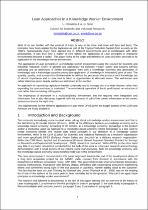JavaScript is disabled for your browser. Some features of this site may not work without it.
- ResearchSpace
- →
- Research Publications/Outputs
- →
- Conference Publications
- →
- View Item
| dc.contributor.author |
Christelis, L

|
|
| dc.contributor.author |
Smit, AG

|
|
| dc.date.accessioned | 2012-09-13T09:03:57Z | |
| dc.date.available | 2012-09-13T09:03:57Z | |
| dc.date.issued | 2012-08 | |
| dc.identifier.citation | Christelis, L and Smit, AG. 2012. Lean approaches in a knowledge worker environment. 9th INCOSE SA Conference 2012: Systems Engineering - the Jewel in the Crown, Pretoria, 27-29 August 2012 | en_US |
| dc.identifier.isbn | 978-0-620-53883-1 | |
| dc.identifier.uri | http://hdl.handle.net/10204/6091 | |
| dc.description | 9th INCOSE SA Conference 2012: Systems Engineering - the Jewel in the Crown, Pretoria, 27-29 August 2012 | en_US |
| dc.description.abstract | Most of us are familiar with the concept of Lean (a way to do more and more with less and less). The principles have been applied by the Japanese as part of the Toyota Production System from as early as the 1950's. Subsequently many have applied this in different environments and in combination with other philosophies. It was thus only a matter of time before the application of Lean principles in enterprise environments became a reality. This paper looks at the origin and definition of Lean and then secondly to its application in the knowledge worker environment. The application of Lean principles in a knowledge worker environment (using the Council for Scientific and Industrial Research (CSIR) in general and specifically the Defence, Peace, Safety and Security (DPSS) operating unit as reference), is further investigated from both a knowledge economy (the generation of knowledge) and a knowledge-based economy (the application of knowledge in innovation) point of view. The quantity, quality, and accessibility of information as well as the processes that produce such knowledge are of utmost importance and a close look is taken at opportunities to eliminate waste. The well-known and rather infamous seven deadly wastes are addressed in this context. An approach for optimising capacity to handle complexity and to manage risk in a wider domain, other than expanding the resource base, is motivated. The commercial equivalent of this is profit based on reduction of cost rather than increasing selling price.The importance of teamwork in a multidisciplinary environment and the required work integration and information flow is also discussed together with the concept of pull of the correct information at the correct abstraction level at the right time. The requirements for the effective application of Lean within DPSS given the bigger context of the CSIR and Armscor are finally alluded to. | en_US |
| dc.language.iso | en | en_US |
| dc.publisher | South African Chapter of the International Council on Systems Engineering (INCOSE SA) | en_US |
| dc.relation.ispartofseries | Workflow;9502 | |
| dc.subject | Lean principles | en_US |
| dc.subject | Enterprise environments | en_US |
| dc.title | Lean approaches in a knowledge worker environment | en_US |
| dc.type | Conference Presentation | en_US |
| dc.identifier.apacitation | Christelis, L., & Smit, A. (2012). Lean approaches in a knowledge worker environment. South African Chapter of the International Council on Systems Engineering (INCOSE SA). http://hdl.handle.net/10204/6091 | en_ZA |
| dc.identifier.chicagocitation | Christelis, L, and AG Smit. "Lean approaches in a knowledge worker environment." (2012): http://hdl.handle.net/10204/6091 | en_ZA |
| dc.identifier.vancouvercitation | Christelis L, Smit A, Lean approaches in a knowledge worker environment; South African Chapter of the International Council on Systems Engineering (INCOSE SA); 2012. http://hdl.handle.net/10204/6091 . | en_ZA |
| dc.identifier.ris | TY - Conference Presentation AU - Christelis, L AU - Smit, AG AB - Most of us are familiar with the concept of Lean (a way to do more and more with less and less). The principles have been applied by the Japanese as part of the Toyota Production System from as early as the 1950's. Subsequently many have applied this in different environments and in combination with other philosophies. It was thus only a matter of time before the application of Lean principles in enterprise environments became a reality. This paper looks at the origin and definition of Lean and then secondly to its application in the knowledge worker environment. The application of Lean principles in a knowledge worker environment (using the Council for Scientific and Industrial Research (CSIR) in general and specifically the Defence, Peace, Safety and Security (DPSS) operating unit as reference), is further investigated from both a knowledge economy (the generation of knowledge) and a knowledge-based economy (the application of knowledge in innovation) point of view. The quantity, quality, and accessibility of information as well as the processes that produce such knowledge are of utmost importance and a close look is taken at opportunities to eliminate waste. The well-known and rather infamous seven deadly wastes are addressed in this context. An approach for optimising capacity to handle complexity and to manage risk in a wider domain, other than expanding the resource base, is motivated. The commercial equivalent of this is profit based on reduction of cost rather than increasing selling price.The importance of teamwork in a multidisciplinary environment and the required work integration and information flow is also discussed together with the concept of pull of the correct information at the correct abstraction level at the right time. The requirements for the effective application of Lean within DPSS given the bigger context of the CSIR and Armscor are finally alluded to. DA - 2012-08 DB - ResearchSpace DP - CSIR KW - Lean principles KW - Enterprise environments LK - https://researchspace.csir.co.za PY - 2012 SM - 978-0-620-53883-1 T1 - Lean approaches in a knowledge worker environment TI - Lean approaches in a knowledge worker environment UR - http://hdl.handle.net/10204/6091 ER - | en_ZA |






